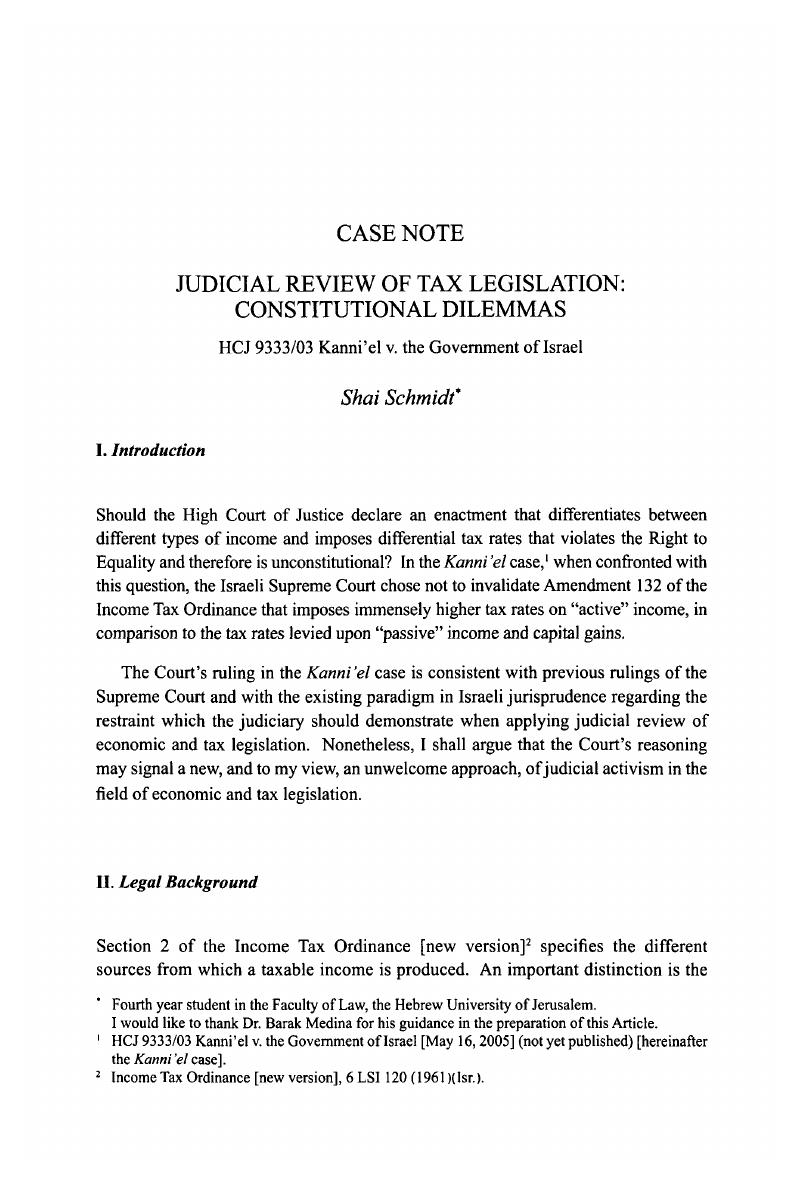Published online by Cambridge University Press: 04 July 2014

Fourth year student in the Faculty of Law, the Hebrew University of Jerusalem.
I would like to thank Dr. Barak Medina for his guidance in the preparation of this Article.
1 HCJ 9333/03 Kanni'el v. the Government of Israel [May 16, 2005] (not yet published) [hereinafter the Kanni'el case].
2 Income Tax Ordinance [new version], 6 LSI 120 (1961)(Isr.).
3 Income Tax Ordinance (Amendment no. 132), 2002 S.H. 530 [hereinafter Amendment 132].
4 Id. at Section 48.
5 The Income Tax Ordinance, supra note 2, at Section 91 & Section 125B.
6 See Kafuta, Me'ir, The Tax Reform of 2003, in Tax Reforms 319, 321–2 (Gliksberg, David ed., 2005) [in Hebrew]Google Scholar; Margalioth, Yoram, An Incomplete and Problematic Implementation of the Negative Income Tax Model in Israel, in Distributional Justice in Israel 283, 284 n.9 (Mautner, Menachem ed., 2000) [in Hebrew]Google Scholar.
7 The Kanni'el case, supra note 1, at para. 8-10.
8 The Basic Law: Human Dignity and Liberty, 1992 S.H. 150.
9 The Kanni'el case, supra note 1, at para. 21.
10 As previously ruled in HCJ 6055/95 Tsemach v. the Minister of Defense [1999] IsrSC 53(5) 241, 258-61.
11 The Kanni'el case, supra note 1, at para. 22.
12 The Ability to Pay principle requires that the total tax burden be distributed among individuals according to their capacity to bear it, taking into account all of the relevant personal characteristics in such a way that the relative loss in economic capacity resulting from the tax is equal. Nevertheless, the primary indicator of ability to pay is commonly agreed to be income. See Margalioth, supra note 6, at 291.
13 The Kanni'el case, supra note 1, at para. 24.
14 See Avi-Yonah, Reuven S., Globalization, Tax Competition, and the Fiscal Crisis of the Welfare State, 113 Harv. L. Rev. 1573 (2000)CrossRefGoogle Scholar.
15 The Kanni'el case, supra note 1, at para. 26-29.
16 See Barak, Aharon, The Economic Constitution of Israel, 4 Mishpat U'Mimshal 357 (1997) [in Hebrew]Google Scholar; Yoran, Aharon, The Constitutional Revolution in the Taxation in Israel, 23 Mishpatim 55 (1994) [in Hebrew]Google Scholar.
17 See CA 6821/93 United Hamizrahi Bank Ltd. v. Migdal Kfar Shitufi [1995] IsrSC 49(4) 221, at para. 69 of Justice Shamgar's opinion.
18 See Rubinstein, Amnon & Medina, Barak, 1 The Constitutional Law of the State of Israel 214–22 (6th ed. 2005) [in Hebrew]Google Scholar.
19 See id. at 254 n.350.
20 See United Hamizrahi Bank Ltd. v. Migdal Kfar Shitufi, supra note 17.
21 Yoran, supra note 16.
22 Edre'i, Yosef, Constitutional and Moral Obstacles Regarding the Taxation of Capital Gains in the Stock Market, 8(6) Misim A-20, 27–35 (1994) [in Hebrew]Google Scholar.
23 See Rubinstein & Medina, supra note 18, at 256-7.
24 See, e.g., HCJ 1661/05 The Regional Council Hof Aza v. the Knesset [2005] IsrSC 59(2) 481 at para. 363 of the Majority's opinion.
25 See, e.g., HCJ 448/81 Resler v. the Minister of Defense [1981] IsrSC 36(1) 81.
26 As recently ruled in HCJ 659/07 The Movement for Quality Government in Israel v. the Minister of Defense [January 29, 2007] (not yet published).
27 The Kanni'el case, supra note 1, at para. 13.
28 The Regional Council Hof Aza v. the Knesset, supra note 24.
29 The Kanni'el case, supra note 1, at para. 29.